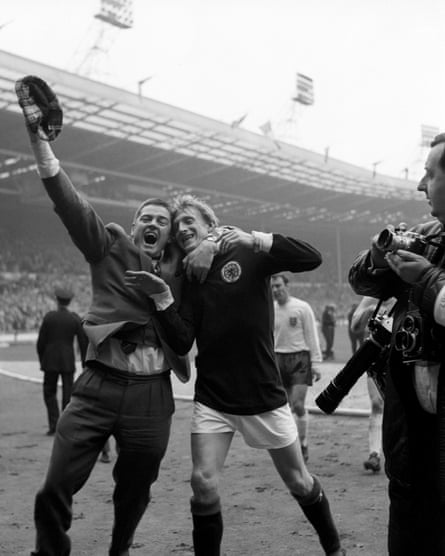15 April 1967 is a date implanted in the mind of any Scotland supporter who wants to declare their team unofficial world champions. The 3-2 victory over Alf Ramsey’s all-conquering England at Wembley is about as good as it has ever got. Denis Law had already missed a sitter from Willie Wallace’s cross by the time he put the visitors in front. Jim Baxter roamed from midfield, Wallace fired towards goal and, following brief ping-pong inside the England penalty area, Law slammed home. Scotland had fretted that Law might not be fit to play in the Home Championship match; he was to be part of a team celebrated over decades.
It is the same fixture at Hampden Park in 1966, though, that better epitomises Law. The forward is already mid-air to meet Willie Johnston’s corner by the time Bobby Moore sees fit to move. George Cohen and Gordon Banks are statuesque on the England goalline as the ball flies past them via Law’s head to afford Scotland a way back into a game where they already trailed by two. Law’s speed of thought was what set him apart. Journalists of the time noticed Law was rarely comfortable speaking about his method of scoring goals; instinct and a sublime talent were his key attributes. The best footballers often find it tricky to articulate how they do things.
England lifted the World Cup months later. It was the real pity of Law’s outstanding international career that he only featured in the competition once, in 1974, by which time he conceded his best days were long gone. The 34-year-old played 90 minutes of the 2-0 win over Zaire but was not used by Willie Ormond as the Scots drew with Brazil and Yugoslavia. A lack of goals, with sad irony, denied Scotland a berth in the second round. Ormond’s refusal to utilise Law at all as his team found the net just once in two games remains perplexing, even taking into account his advancing years.
The Zaire fixture, in Dortmund, was the last of Law’s 55 caps. His goal tally of 30 renders him the joint top scorer in the country’s history. Kenny Dalglish, with whom Law shares the honour, needed 102 games to reach the same tally. In fairness to Dalglish, while the Scotland team he played in was stellar, it lacked the creative spark of Baxter, Wallace, Johnston and Jimmy Johnstone. Billy Bremner, Bobby Murdoch and Tommy Gemmell covered the hard yards. A glance at who could not get in the team Law starred in depicts how strong it was.
Commentary of the 1966 clash highlights one thing Law and Dalglish had in common. “A man that so many of the Scots criticise so often,” is the term used as the replay of Law’s header is shown. An expectation exists within Scottish supporters, then and now, that internationals arriving from Manchester United or Liverpool should be able to single-handedly ping opponents about as if they are Subbuteo players. Law wasn’t just a superstar, he remains Scotland’s only winner of the Ballon D’Or. Teammates appreciated his greatness. So, too, opponents. “He was exceptional and different from the British players of his era,” said Eusebio.

It is incredible for Law’s contribution to Scottish football to be so stated given he never actually played domestically in the country. Or perhaps that merely illustrates his brilliance. He is a hall of fame inductee at Hampden Park – obviously – and was named as the country’s most outstanding player of the previous five decades by the Scottish Football Association in 2003. Sir Alex Ferguson labelled Law not just the “finest player Scotland ever produced” but “one of the greatest the world has ever seen.” Ferguson added: “He epitomised everything that a Scotsman is about. He was daring and courageous, he had that bravado about him and he had style. He was a truly fantastic footballer.”
Aberdeen links Law and Ferguson, without either having played for the club. Ferguson: the all-conquering manager. Law: the child who grew up in the Woodside area of the city, walking barefoot to school owing to the poverty of his time. Law, who was one of seven children, was allowed a bath once a week. He and his brothers attended Pittodrie when they could afford it, Law identifying an early hero in George Hamilton, who averaged better than a goal every two appearances during two spells at Aberdeen.
His was a poor but happy upbringing. Not only was Law a bright student but he had discovered football at an early stage. The route to and from school would be spent kicking tennis balls or tin cans. Law was single-minded; he rejected a move to Aberdeen Grammar School on the basis this was not a football-playing domain. His scoring prowess at Powis Academy regularly made the pages of the Aberdeen Evening Express.
Aberdeen were still not of a mind to move for a prodigious inside forward and Scottish schoolboy international on their doorstep. What a blunder. Common consensus is that appearances played a part: Law was small, slight and wore glasses to assist with a squint that was only corrected via surgery when he signed for Huddersfield Town. Huddersfield’s manager, Andy Beattie, was also an Aberdonian and used his brother to scout for talent. Archie Beattie identified the 14-year-old Law as a hot prospect, and the rest is history.
The “courage” to which Ferguson referred is fair; the Law family had never left Scotland until Denis was handed a trial in Yorkshire. Soon Law was out of the reach of Scotland’s biggest clubs. It was another of the country’s famous footballing sons, Bill Shankly, who kick-started things for Law at Huddersfield after Andy Beattie harboured doubts.
Endearingly, Law never forgot Aberdeen – and Aberdeen certainly never forgot him. He met his wife, Diana, in a dance hall in the city when they were teenagers. More than 15,000 people lined streets as Law was granted the freedom of the city in 2017. Law spoke of his “beloved Aberdeen” as a second statue of him was unveiled there four years later.
The Denis Law Legacy Trust, a children’s charity, has undertaken fantastic work to bring free-to-access sport and creative activity in the north east since 2006. The Trust’s “Cruyff Court Denis Law” – an outdoor community sporting facility - on Catherine Street in Aberdeen stands as one of umpteen permanent reminders that this icon of Manchester United never forgot his roots. On the field, it is unlikely Scotland will ever see his like again.

.png) 3 months ago
36
3 months ago
36













































